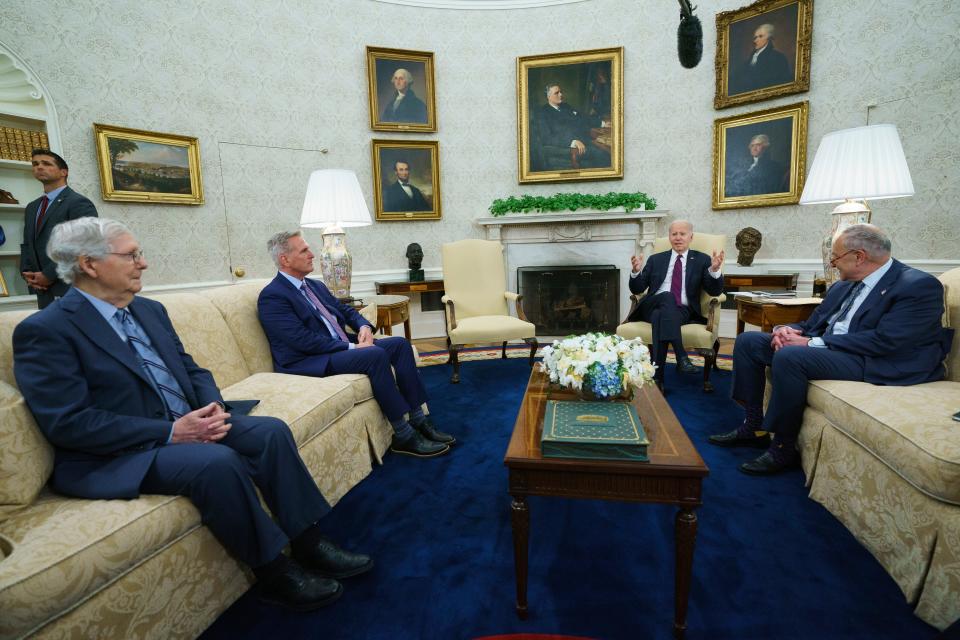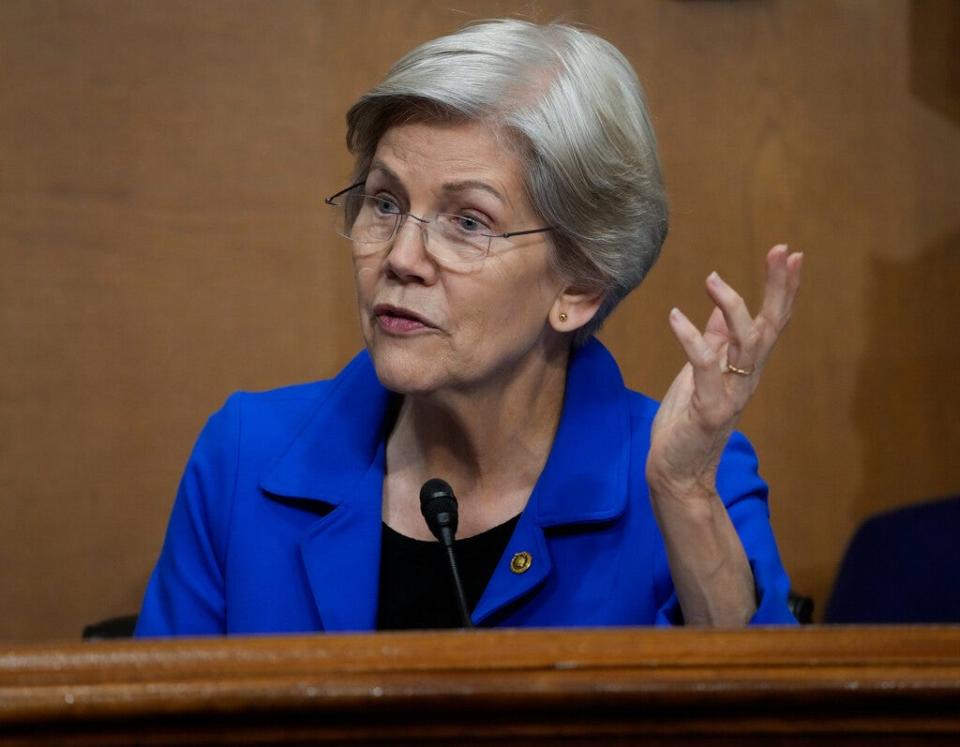Senate leaders must now navigate debt ceiling deal: 3 things to know
- Oops!Something went wrong.Please try again later.
- Oops!Something went wrong.Please try again later.
- Oops!Something went wrong.Please try again later.
- Oops!Something went wrong.Please try again later.
The clock continues to tick as a bipartisan bargain to raise America’s debt ceiling faces an arguably riskier trial now that it has cleared the Republican-controlled House.
That’s because just one senator in the Democratic-run chamber has the power to thwart the plan reached by President Joe Biden and Speaker Kevin McCarthy ahead of the June 5 default deadline.
Even a small procedural motion could delay the deal’s passage, which the White House and congressional leaders warn could put financial markets and average Americans at risk.
"A default would trigger a recession, cost millions of jobs, and devastate retirement accounts," the White House Twitter account declared Wednesday.
Rank-and-file senators from both parties bucked their leadership, demanding either changes to the deal or at the every least committments to address their concerns in future proposals.
"To my House colleagues, I can't believe you did this," Sen. Lindsey Graham, R-S.C., who criticized defense spending levels in the bill, said in a floor speech Thursday. "To the Speaker, I know you got a tough job. I like you, but the party of Ronald Reagan is dying."
A default would trigger a recession, cost millions of jobs, and devastate retirement accounts.
President Biden and Congressional leaders reached a bipartisan budget agreement to avoid a default.
Now, the House and Senate must pass it.— The White House (@WhiteHouse) May 31, 2023
Senate Majority Leader Chuck Schumer, D-N.Y., reiterated Thursday that brinksmanship isn't an option and that senator's should be prepared to stay as long as it takes.
"The Senate will stay in session until we send a bill avoiding default to President Biden's desk," he said. "We will keep working until the job is done. Time is a luxury the Senate does not have."

Senate Minority Leader Mitch McConnell, R-Ky., tried to give Republican members cover when he praised the plan as the first step in bringing "Democrats’ reckless spending to heel."
Just as Biden and McCarthy had to make concessions that upset the more outspoken factions of their political base to make a pact, the two Senate leaders will have to cooperate to push the agreement to the finish line.
Here are the main takeaways from the Senate side of the debt debate.
No time for amendments
Whatever reservations senators might have about the Biden-McCarthy deal, there's no time for them to change the proposal and send it back to the House.
Schumer made that clear Wednesday when he said the consequences of slipping past the June 5 deadline would be "catastrophic nightmare" for the global economy and millions of U.S. families.
"So any needless delay, any last-minute brinksmanship at this point would be an unacceptable risk," he said. "Moving quickly, working together to avoid default is the responsible and necessary thing to do."

What’s expected is the Senate leaders will devise a way to minimize debate and carve out space for amendment votes that they know will fail but will let out some member's steam.
Sens. Rick Scott, R-Florida, and Mitt Romnney, R-Utah, told reporters after GOP lunch that lawmakers intend to finish the debt limit bill and amendment votes Thursday.
But the Senate timetable remained in flux Thursday afternoon as officials cautioned that the measure may not be approved until Friday as members from both sides of the aisle want to take jabs at parts of the Biden-McCarthy deal.
Schumer, who emphasized how Democrats and Republicans didn't get everything they wanted, still needs all 100 senators to agree to a vote timetable, and many are demanding amendment votes that will likely fail.
Elizabeth Warren: Republicans 'take hostages,' but should Dems?
That might not be enough to please liberal lawmakers and their allies who have have been furious about negotiations.
Some appeared to suggest that Democrats should play hardball.

"We shouldn't be in this position," Sen. Elizabeth Warren, of Massachusetts, told reporters Wednesday. "The problem we've got is that the Republicans are willing to take hostages and the Democrats are not."
Warren, who hasn't said how she'll vote, ripped many of the provisions in the deal, such as the work requirements for government aid. Going into the debate, she has called attention to how the House GOP is demanding the U.S. "pinch pennies" on welfare programs but will pivot to extend the Trump-era tax cuts in the coming weeks.
"This is not fiscal responsibility," she said. "It’s cruelty."
Right now, House Republicans are demanding we pinch pennies on programs like food assistance & health care for families.
Next month, they want to roll out a plan that hands trillions in tax cuts to big corporations & the wealthy. This is not fiscal responsibility. It’s cruelty.— Elizabeth Warren (@ewarren) May 30, 2023
Sen. Tim Kaine, D-Va., vowed to file an amendment to ditch approval of the Mountain Valley Pipeline, a natural gas project that he has fought for months.
But other Democrats might be inclined to move on and are voicing a more conciliatory tone, such as New Jersey Sen. Cory Booker, who sent a cryptic video message amid the debt ceiling clash saying how "every disagreement doesn't necessitate a debate."
What will Rand Paul and other conservatives do?
Similar to the right-wing rebellion McCarthy faced in the House, McConnell isn't going to get a break from fiscal hawks who say the debt deal isn't satisfactory.
Sen. Rand Paul, R-Ky., blasted the plan as being backed by "fake conservatives" within hours of it being announced last weekend. He has a history of leveraging important deadlines to make a point and has telegraphed that he plans to seek a vote on an alternative debt ceiling plan that would make billions in additional cuts.

"There’s nothing conservative about a debt deal that grants unlimited borrowing for two years that experts estimate will likely exceed $4 trillion," Paul said in a tweet Wednesday. "I will insist on an amendment vote to enact real spending caps that lead to a balanced budget in 5 years!"
Paul has acknowledged that his proposal doesn't have the necessary 50 votes, but he isn't the only GOP senator who could cause headaches. Others conservative senators have objections, such as Mike Lee of Utah and Lindsey Graham of South Carolina, who wants more money for defense spending.
This stands in contrast to McConnell and his leadership team, who like Schumer on the Democratic side have endorsed the deal and have tried to sell their members on what it will achieve.
“Republicans stood united. They forced President Biden to do his job," McConnell said Wednesday on the Senate floor. "And they reached an agreement that preserves the full faith and credit of the United States and starts getting its financial house in order."
McConnell stressed how Republicans have "put a dent in" the Democrats' agenda in a plan that reduces spending by more than $1 trillion.
"House Republicans’ unity gave them the upper hand. And they used it to secure a much-needed step in the right direction," he said. “When this agreement reaches the Senate, I’ll be proud to support it without delay.”
This article originally appeared on USA TODAY: Schumer, McConnell look to temper debt deal fight: 3 things to know

